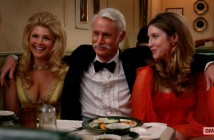Mad Men: Retrospective
Editor’s Note: Season 7 of Mad Men premiere’s Sunday, April 13th at 9pm EST.
“When it went away, he was heartbroken. And then he realized everything he already had was not right either. And that was why it had happened at all. And that his life with his family was some temporary bandage on a permanent wound.”-Pete Campbell
Mad Men is a show about a nation in turmoil weathering a decade of monumental change, the likes of which we are still contending with today. But more than that, it is a show about a series of broken people slowly coming to terms (or failing to come to terms) with the ways that the world is leaving them behind. Since before the show began, Dick Whitman has been running from himself, from his past, and from the notion that some breaks just cannot be fixed, that some wounds will never heal. He ran from himself into a different identity, onto a different coast, into a different career and two different marriages. He fled from his demons down the bottom of so many bottles, the drink threatened to overtake him entirely. He’d drown himself to look in the mirror and see something different.
But then something happened. Don Draper has been changing his whole life, throwing away everything that isn’t essential to escape what’s coming, but he learned he can’t, finally, run away from himself. He learned he can’t escape the man he truly is, which made last year’s season finale, “In Care Of,” one of the most exhilarating hours of television in the entire run of the show. Throughout the series, Don Draper has changed as a means of escape. But as we ended the sixth season, Don changed as a last, desperate attempt to actually stay around (though not, at least temporarily, at the offices of SC&P, where he has been put on indefinite leave). Last season ended with Don Draper standing in front of the house where he grew up with his children, finally giving them something real of himself after spending years feeding them empty lies. For once in his life, Don Draper is putting down the drink and truly looking himself, his real self, in the mirror.
The penultimate season of Mad Men was about Don Draper losing: his job, his wife, his children, his position of respect. But mostly, it was about him losing control. Throughout the series, Don Draper has been a compelling figure in large part for the way he controls the situation around him. His magic is in the way he shifts perception, selling clients on the need for advertising, selling customers on the need for a product, selling everyone around him on some idealized version of himself that he keeps tantalizingly just out of reach. Season six told us the story of what happened when Don Draper stopped selling and started looking at the things all that shilling has wrought.
Every episode of Mad Men has opened with the image of a man plummeting through the New York skyline from high atop a skyscraper. Whether he jumped or was pushed has never been clear, and it’s never really mattered. It’s the fall that captivates us, and perhaps, if we’re lucky, a subsequent climb. Heading into the final season of the show (which will be bisected into two halves of seven episodes, the first of which begins tomorrow), that is the question left on the table. As the show enters its endgame, it will clarify, finally, what it has always been about. Is it tracking the inevitable decline of the white male hegemony, broken by the shell game that sustained it for millennia? Is this the story of Don Draper’s fall from grace, from a position of power and authority he never really earned to a place more fitting a man who has done all that he has? Or is there still a chance for triumph? Can Dick Whitman still redeem himself? Can he slow the fall, or is he about to smash into the ground?
If Mad Men is a show about existential authenticity, about the people we can choose to be, and the ways we may fail to make those choices completely, then the question it has set up for its final season is whether Don Draper can turn the illusion of change he’s been peddling for six seasons now into its actuality, or whether this is, as Pete Campbell put it in the quote I used to open this piece (and perhaps my favorite line in the entire series, for how tragically it evokes the show’s chief theme), just another “temporary bandage on a permanent wound.” This is a question of aching importance, now as ever, in our lives and in the entertainment we use to populate them. We all believe, on some level, that we can change, that we can better ourselves and become our ideals. That’s what Dick Whitman believed when he grabbed another man’s dog tags in the dirt of Korea. That’s what he has told himself every day since, as he wakes up in another man’s life, the one he built for himself while hiding from the truth. Mad Men has always been skeptical of how completely people can change, mostly because it doubts they are willing to put in the real work to do so.
At the end of season six, Don Draper comes clean about his childhood in a whore house during a meeting with Hershey’s the perfect product to encapsulate childhood nostalgia (or at least, the best since season one’s “The Wheel”). As last season ended, Don’s revelation was tied to the admission he makes to his children outside that childhood home, and even to the election of Richard Nixon, which occurred in that finale. Parents reassure their children that everything will be ok, that there are no monsters under the bed and that the sun will rise again in the morning. Advertisers tell their customers that the world is a bright and shiny place full of essential products; they sell a nostalgia for a time that never existed, often trading (as Don did in that Hershey’s pitch) on a sense of comfort people tend to associate with childhood. Nixon won the election by appealing to people’s need to be coddled, by assuring America that all that darkness would go away if only it would let him show them the way.
Of course, nothing is ever that simple, as poor Sally Draper has been learning again and again over the course of the series. Sally has started to see through the lie, often because the adults in her life have done a very poor job of concealing it, but also because she is growing up, and part of becoming an adult is learning about this core untruth. Parents aren’t super heroes; they are people. A Hershey’s bar isn’t a time machine’ its candy coating nothing in particular. Nixon won’t save America; he’ll resign in disgrace. This may seem like a shift from optimism to cynicism, but I don’t think that’s true. It’s the shift from childhood to adulthood, the opening of one’s eyes and the shedding of naivety.
The story of Mad Men is the story of Don Draper shedding one lie after another as they cease to be useful to him. He worries, deep down, as he sheds each skin for a more convenient shape, that he’ll someday find he has whittled himself away to an empty center. But maybe, just maybe, he’ll peel back enough layers to find some fundamental self at his core, beneath the lies, beneath the hurt and the pain. A self that can look in the mirror without fear or shame. A self that can contend with what he’s done, atone for the mistakes he has made, and move forward, into a new decade and a new American age, not unburdened from his past, but able to reckon with it properly. Like everything else in his life, Don Draper’s path to betterment will be made on his own terms. What remains to be seen is whether he can find his way to the peak of the mountain, or whether he’ll tumble back to its base. The only question left is whether that man we see in the opening credits is falling to his death, or whether he may yet learn to fly.




